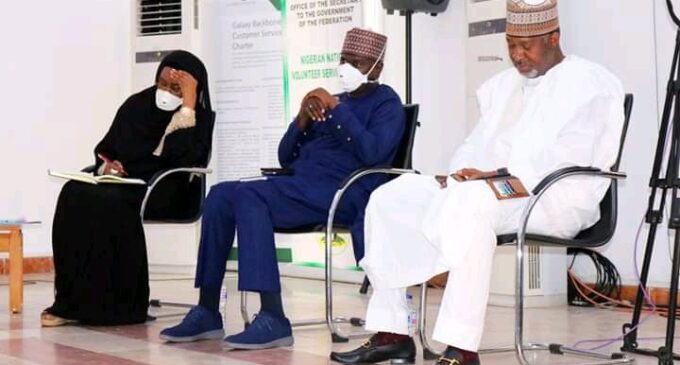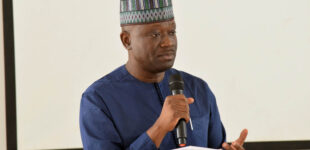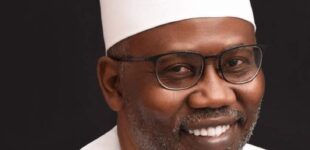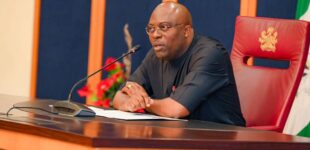Why Nigeria is losing the COVID-19 war

I imagine that someone would regard this headline as dramatic, even hyperbolic, and that would be totally understandable. Given the statistics of accomplishments that the Presidential Task Force on COVID-19 reels out during its daily press briefings and most especially last Monday, it is quite tempting to conclude that Nigeria is on the way to repeating its 2014 performance against Ebola.
Mustapha listed achievements of the preceding two weeks to include: Increase in the number of laboratories from 15 to 26; cumulative testing of 35,098 people; Increase in the number of trained personnel to 11,409; procurement and distribution of additional Personal Protective Equipment and ventilators; slowing down the doubling time of the virus from seven to 11 days; increase in the number of isolation centres and case management beds from 3,500 to 5,000; improvement in identification, testing, evacuation and isolation process as well as “progressive improvement in capacity of the health system…”A list like this juxtaposed with the relative low incidence of mortality and total number of infections as yet, would tempt anyone to credit Nigeria with a measure of success.
These facts however raise very worrisome questions about Nigeria’s management of the pandemic. One is the fact that only 35,000 people have been tested in a population of about 200 million, 11 weeks after the index case was discovered and several weeks after the reality of community transmission was ascertained. Now, it is common knowledge that the true number of infections is a function of the number of tests already conducted. If there are over 6,000 infections from the tests conducted so far, one can only imagine the true number of infections. Even then, the country is exhausting the capacity to deal with the number of cases it currently has. According to the PTF chairman, there are 5,000 bed spaces for isolation and treatment. As of Wednesday morning, there were already 6,401 cases out of which 4,475 were active when you considered the 1,734 already discharged and 192 mortalities. With the rate of new infections announced, it is only a matter of time before bed spaces become a scramble.
Concerning mortalities, the health minister, Osagie Ehanire, highlighted the contribution of self-medication and home treatment earlier this week. He also advised that people should seek treatment once they were diagnosed. That raises a question; is there a category of people allowed to pick and choose whether they would receive treatment or not?
This question becomes pertinent because the known protocol is that the Nigeria Centre of Disease Control takes over the management of cases once they test positive. This time round, Ehanire was not appealing to people with associated symptoms to come forward for testing, he asked those already tested and confirmed to be positive to submit to treatment. That is very curious. So, did the minister again communicate amiss here or this abnormal situation has indeed been happening? This intervention will dwell a bit more on the communication of the management of COVID-19 to Nigerians in a bit.
Still on the issue of mortalities, it is important to ask whether the harvest of deaths in Kano, 80 per cent of which the PTF linked to this pandemic, is in contemplation. What about the 100 dead and buried in Jigawa State and the 150 said to have suffered the same fate in Yobe State? Does Nigeria truly have an idea of the number of lives it has lost to the coronavirus infection or we just conclude that we have lost hundreds of people to unknown causes, which no one is investigating? Is that how a country operates?
Things can however get worse with the emerging trend of disbelief amongst Nigerians. At the outset, dismissal of the existence of coronavirus in Nigeria was largely amongst the lower class. And in their case, it is easy to attribute this to ignorance, poverty and other such deprivations. But there is a growing scepticism amongst the educated and knowledgeable, some of who believe that this is nothing but a scam.
As much as this attitude does not lend itself to reason, the conduct and communication of some of the country’s leaders put fuel on the fire of doubt. Messages to the public on coronavirus and its debilitating effects on the people lack harmony and create a huge confusion in the minds of traumatised citizens burdened by and struggling with survival.
Take Ehanire’s response to the question about the whereabouts of the Chinese personnel that he was so upbeat about early April. Tackling a question on Monday, the minister who had made a huge deal of the importance of having these people in-country, sang about why they were not so important to the country but the China Civil Engineering Construction Corporation. “They are not really our guests in that sense but we have been able to learn some things from them,” he told reporters.
Within hours, CCECC’s Managing Director, Michael Yigao, corroborated the minister’s claim. He said that the team had a telecast with the minister of health and some doctors on how China managed COVID-19. Thereafter “they are here with us and have continued to teach our staff how to protect themselves, because protection and prevention are more important than the treatment…” The day after, the mission of the Chinese swelled to include the assistance in building and equipping isolation centres, according to Minister of Interior, Rauf Aregbesola. This, presumably, was without the knowledge of the health minister. Or, was he just too upset to tell reporters this? Whatever it is, dodgy and inconsistent responses like these create distrust.
Then on Tuesday, Director General of the National Orientation Agency, Dr Garba Abari, took on the security agencies for the poor enforcement of interstate movement restrictions ordered by the President. The first question to ask here is where Abari and his agency have been all this while and how much they have contributed to enlightening members of the security forces and the generality of Nigerians on current realities and the importance of individual responsibility.
Apart from pecuniary gains, many policemen allow these compromises because they fail to see the connection between uncontrolled movement, the spread of the virus and collective danger it poses to the general populace by these movements, a consequence of the quality of education they got or did not get in their formative years.
Then, there is the irresponsibility of some state governors, which makes the alignment of strategies to confront the pandemic impossible. This discordance is sending conflicting messages to the public to a point that a new wave of doubt on whether the whole campaign is a hoax is on the horizon. Hours after the President, Major General Muhammadu Buhari (retd.), ordered the extension of the lockdown on Kano State for instance, Governor Abdullahi Ganduje approved congregational Eid prayers in the state. That is a state with the second highest number of official deaths from COVID-19 and one with probably the largest unbelieving and in fact unaware population in the country. On Wednesday, his colleague in Bauchi State, Bala Mohammed, a COVID-19 survivor, followed suit. And this really makes one wonder what statement Nigerian leaders try to make out of unyielding insistence on religious in spite of the prevailing circumstances.
Saudi Arabia, which would ordinarily be hosting thousands of people on pilgrimage for lesser Hajj at about this time left no chance for the religious rite this year. That is not all, the foremost Islamic country in the world is enforcing a 24-hour lockdown throughout the Eid-al fitr holidays. This is a country with a not just a stronger health system than Nigeria but one which has lower morality rate from the pandemic given that it has only 351 deaths out of over 65, 000 confirmed cases! There are indeed uncertainties about this year’s edition of the holy pilgrimage. Governors in Nigeria just seem to downplay the seriousness of the issue at hand encouraging the growing development of doubts and ultimately playing games with the lives of their citizens. That is not to speak about the Kogi State administration, which literarily makes a joke of the entire pandemic.
So, what is the point? Nigeria needs better coordinated communication at this point when its leaders are considering re-opening the country. Everyone envisages a spike in the number of cases following the gradual easing of the lockdown two weeks ago and the total disregard for basic advisories on how to stay uninfected. This can only get worse without a deliberate attempt to convince those in positions across the country to speak the same language about the precarious situation Nigeria is in. Buhari’s meeting with the state governors on Monday is one of those steps that could engender a consensual approach to the management of the pandemic. However, the PTF needs to engage more with stakeholders even to the community level.
Most importantly, it needs to plan its messaging and communication at this stage. Members must realise that what they say or do not say will go a long way in shaping the perception of Nigerians, all of whose cooperation is needed in the fight.
Adedokun tweets@niranadedokun
Views expressed by contributors are strictly personal and not of TheCable.














There are no comments at the moment, do you want to add one?
Write a comment